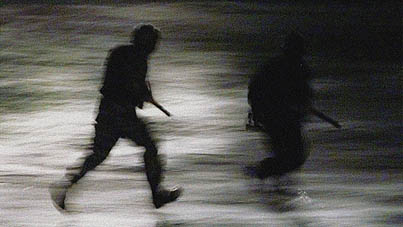Terror in Moscow

Russian soldiers mobilize outside the Moscow theatre.
REUTERS / Sergei Karpukhin

Vesselin Nedkov.
Nicolas Morin
Only when you reflect on the extraordinary experience he's had does Vesselin Nedkov's ordinariness seem remarkable. The 30-year-old McGill MBA student is cheerful, friendly, and has a distinctly European sense of courtesy that comes out in his profuse apologies for keeping me waiting five minutes for our interview at a downtown café on an especially frosty day in January. Nedkov is enduring his first Montreal winter, for which growing up in Bulgaria has not fully prepared him.
But then, coming to terms with unexpected circumstances is something at which Nedkov has proven adept - and under far graver extremes than the frigid wind chill that buffets Montreal's McTavish Street.
"I'm not a risk taker. I am too reasonable, too logical in my thinking," he says, reflectively sipping on a cappuccino. "It's my nature to plot things through very rationally before taking a decision."
On Tuesday, October 22, 2002, having wrapped up his business representing a Bulgarian forklift company in Moscow, Nedkov happened by a poster for Nord-Ost, the musical sensation of the Russian theatre. A friend, Irina Filipova, mentioned that she was curious about it. Wanting to express his thanks for all the effort she'd put into tutoring him in English, Nedkov promptly purchased two tickets for the following night.
How ironic that a spontaneous decision should prove so fateful...
As the second act of the musical commenced, 48 Chechen terrorists stormed the House of Culture, taking the 800 people in the audience and cast hostage. They demanded nothing less than that Russian forces withdraw from Chechnya. Thus began a terrifying standoff that would drag on for 57 hours and end in the deaths of 129 hostages.
The Chechen Conflict
With the demise of the Soviet Union in 1991, Chechnya sought independence in the manner of the Soviet Republics that took the opportunity to break free of Russia. However, the oil-rich territory in the Caucasus was not designated a republic, but an autonomous region within the Russian Federation that Moscow had no intention of surrendering.
The largely Muslim population of Chechnya has flouted Russian control since the days of the Tsar. For their alleged collaboration with the Nazis during World War II, Josef Stalin forcibly deported half a million Chechens from their homeland to Central Asia. Even conservative estimates suggest more than 78,000 people died during the resettlement. The survivors streamed back home as soon as Nikita Khrushchev embarked on the process of de-Stalinization. Their bitterness and fierce sense of independence were only reinforced in exile.
Over the past decade, Russian troops have been in and out of Chechnya to do battle with separatist elements. Most recently, they have been in conflict since 1999 when regional president Aslan Maskhadov proclaimed Islamic law, followed by an invasion by Chechen forces of the neighbouring territory of Dagestan, and a series of bomb attacks that rocked Moscow. Maskhadov has declared holy war and commanded all Chechen men to join the fight, which has been characterized by exceptional cruelty on both sides.
Bombs and Black Widows
The terrorists who stormed the Moscow theatre brandished machine guns at their captives and proceeded to booby-trap the building against an assault by Special Forces or police. The female assailants, only their eyes visible from beneath their hijabs, were draped in explosives, clutching detonators in anticipation of the order to immolate themselves. They were the wives and mothers of dead Chechen rebels, grimly nicknamed "black widows" by the Russian populace.
"We want to die more than you want to live," the terrorists reminded their hostages on several occasions. This truth - the sincerity of which Nedkov had no doubt, even though he sensed a measure of hesitation on the part of some of the women - more than anything else epitomized the utter disparity between hostage and hostage-taker.
"My life experience, which is average and middle class, was thrust into direct confrontation with people whose experience of life was so extreme and so alien that it was hard to believe we inhabit the same planet," Nedkov writes in 57 Hours: A Survivor's Account of the Moscow Hostage Drama, his book about the crisis published last year by Viking.
The difference, it seems, is between being raised on hopes for the future and despair over the past.
"We are so vulnerable to those who have been taught they have nothing to lose," Nedkov reflects. "I attempted to talk to the terrorists on a couple of occasions, but there was no logical argument to put to dissuade them."
Early on in the drama, foreigners were separated from the Russians, which gave Nedkov hope of an early release. Logically speaking, the Chechens, recipients of some international sympathy, wouldn't gain any advantage by alienating a worldwide audience already on edge vis-E0-vis Islamic terrorism. The Russians, on the other hand, might perceive an opportunity to turn world opinion to its side if the terrorists were seen to be indiscriminately brutalizing innocents. To the politics of the situation, Nedkov remained helpless. "Were the authorities the solution, or part of the problem?" he asked in his book. The answer still eludes him.
During his captivity, he speculated that the government would perhaps agree to pull a token number of troops out of Chechnya as a show of good faith in exchange for the hostages. But that hope was vain. The Russian hostages, who were more attuned to their government's mindset, knew that the authorities could prove as much of a threat to their well-being as the terrorists. President Vladimir Putin made no secret of his determination not to make concessions to Chechen separatists. Indeed, throughout the standoff, no senior political leader went to the theatre to engage the terrorists or even to publicly express their concern.


